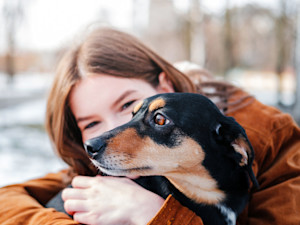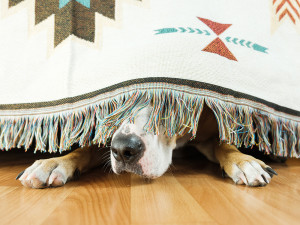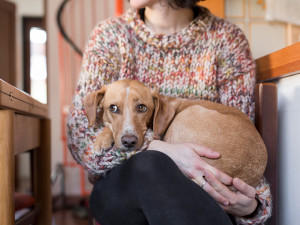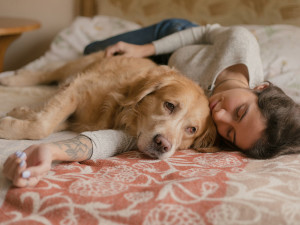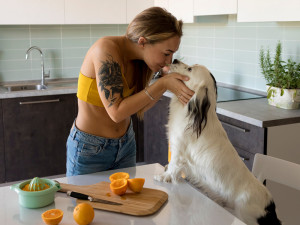6 Scents Your Dog Probably Can’t Stand
A dog’s sense of smell can be 100,000 times stronger than a human—so when it’s bad, it’s bad.
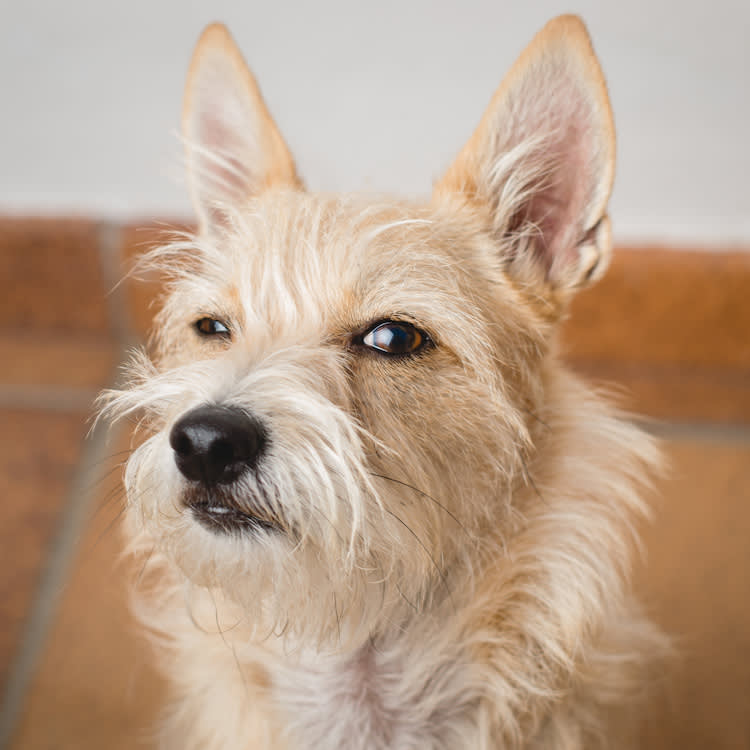
Share Article
I’ve seen my dog smell some strange stuff over the years. My feet, street garbage, a new rug after she rubs her butt on it; it’s all been fair game with this one. To be honest, there’s not much she won’t dig her nose into when given the opportunity. Of course, none of this will come as a huge surprise to anybody who has ever met a dog. Smelling is kind of their thing.
Renee Rhoades, applied animal behaviorist at R+Dogsopens in new tab, confirms as much. “Being an olfactory-based species there are not a lot of smells that dogs don’t find interesting,” she says. In fact, Rhoades explains that dogs tend to gravitate toward complex smells — usually the stronger the better. This will often include the organic scents of the earth like grass, mud, and plants. Some studies have found they’re particularly partial to the scent of edible plant products such as blueberry, blackberry, peppermint, rose, and lavender.
Unfortunately, this desire for multifaceted sniffs can also result in, let’s say, less-than-ideal scent preferences. “Dogs enjoy complex smells, for instance, urine or feces of other animals. Another animal’s waste product is going to have a lot of chemical compounds in it making it a rich olfactory experience for a dog to engage with,” Rhoades adds.
As I rethink every time I’ve kissed my dog’s nose and mourn the joy it once brought me, it’s important to note how crucial their smelling abilities are to the canine existence. “A dog’s whole world is really navigated through their nose,” says Leigh Siegfried, the founder and training director of Opportunity Barksopens in new tab. Most estimates have a dog’s sense of smell somewhere around 10,000 to 100,000 times stronger than a human’s. With this, dogs use their noses to guide them, perceive their surroundings, and communicate with other pups.

Still, as hard as it may be to believe, they don’t love every smell. Some scents dogs downright despise. And considering how much stronger their sense of smell is compared to humans, the discomfort these scents bring upon their nostrils can be excruciating. Think of how you feel when you smell a skunk and multiply the intensity by 10,000.
Like any superpower, a dog’s superior smelling capability can be a double-edged sword at times. As Michelle Bernstein, animal behavior scientist at VCA Animal Hospitalsopens in new tab, explains, “Dogs are highly sensitive to smells so a strong scent can cause them to become overwhelmed. Some of these scents are even toxic to them.”
Scents your dog (probably) hates
With that in mind, it’s best to avoid the following fragrances around your pup.
Citrus
When thinking of the smells dogs most try to avoid, anything citrus is generally what experts have top of mind. The classic examples of citrus foods that pups hate are lemons, limes, oranges, and grapefruits. Siegfried explains it’s their acidic nature that creates an aroma that turns dogs off.
“I think it’s a strong offensive odor. If you ever peeled an orange and invited your dog to sniff your fingers, they’ll probably not want to get in there,” she adds. This is actually a popular polling position in the animal kingdom. It’s why we’re able to use citronella candles to keep our least favorite living creatures at bay: insects.
Cleaning products
If it were up to my dog, I’d never clean the house. Not only does she actively enjoy rolling in dirt and probably believes that cleaning time could be better spent with her on the couch but many household products give off nasty odors. These cleaning tools often use chlorine and ammonia, which create a harsh bleach-like smell dogs hate as much as we do. Not to mention, they’re equally dangerous for both of us.
“We understand that these types of chemicals can be harmful to us so it is likely that the reason why dogs tend to avoid these smells is because of their toxic nature,” Rhoades says. If you’re wondering, this distaste also extends to rubbing alcohol.
Beauty products
By all accounts, dogs are not huge fans of the beauty industry. On some level, it makes sense, my dog rolls out of bed and looks absolutely perfect literally every day with no effort. She certainly doesn’t require a multi-step skincare routine to feel pretty like her dad does.
Not to mention, beauty products can often be just as toxic to dogs as cleaning tools. “It’s likely that a dog would be put off by smells related to cleaning products or heavy artificial perfume smells,” Rhoades says. In addition to perfumes, nail polish can also cause some nasal damage.
Mothballs
I don’t know if I was the only one who had to hear this as an adult, but mothballs are made of chemicals. As a result, they’re straight-up poisonous to dogs. Not that my dog needed to be told because she’s equipped with built-in chemical radar. “Not only do dogs pick up scent from the air but located on the roof of their mouth is the Jacobson’s, or vomeronasal, organ, which detects chemicals,” Rhoades explains.
Herbs and spices
There’s a reason most dogs enjoy eating the same food day in and day out: They don’t want to spice it up. Bernstein explains that they hate the smell of many herbs and spices. Rosemary, mint, basil, and garlic are all enemies of the canine nose. While it’s technically neither a spice nor herb, Bernstein notes dogs don’t like to sniff onions, either. For my pup, I can only imagine it’s out of fear for her tear ducts, likely due to the number of times she’s seen me ugly-cry during The Notebook.
Vinegar
Just like anything citrus, vinegar is incredibly acidic and therefore produces a smell pooches loathe. While it’s technically safe for dogs to eat, Rhoades recommends avoiding the smells they don’t like. And you certainly shouldn’t be using them in training. “Just like we don’t enjoy having smells we dislike around often, it would be better for dogs’ health overall to not be exposed to disliked smells on a regular basis,” she says.
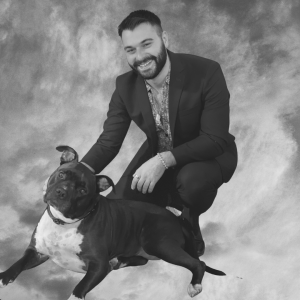
Sean Zucker
Sean Zucker is a writer whose work has been featured in Points In Case, The Daily Drunk, Posty, and WellWell. He has an adopted Pit Bull named Banshee whose work has been featured on the kitchen floor and whose behavioral issues rival his own.
Related articles
![Woman holding her scared dog outside.]()
5 Surprising Things That Dogs Are Afraid Of
And what to do when they go careening away from the Roomba.
![Dog hiding under the sofa and afraid to go out because he heard fireworks.]()
Why Are Dogs Scared of Fireworks?
How to keep your dog mentally and physically safe this New Year’s.
![shy dog frightened in the arms of the owner. this brown mixed-breed hound puppy has a sweet gaze. the female owner has a wool sweater]()
Why Is My Dog Shaking? Causes and Treatment
A vet explains why the weather isn’t always to blame.
Does Your Dog Need Anti-Anxiety Meds?
How to cope with dog anxiety—from training to medication.
![A woman holding her dog close.]()
FYI, Your Dog Can’t Stand When You Do These 7 Things
Thanks, they hate it.
Can Dogs Eat Oranges and Orange Peels?
Yes, Oranges are a Nutritious Treat for Dogs

